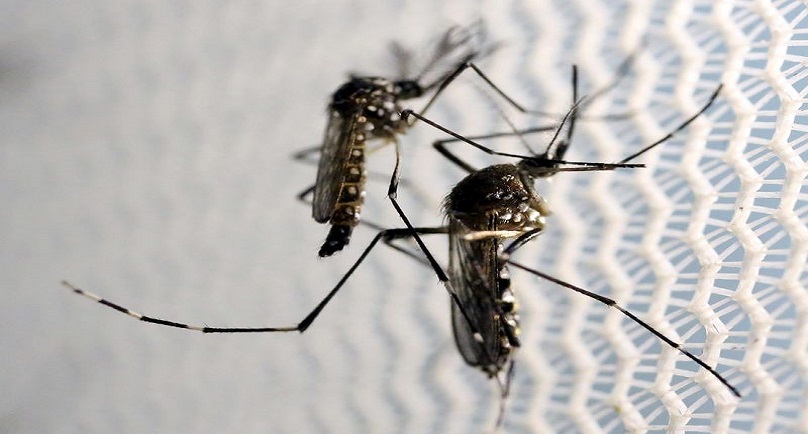Image: Aedes aegypti mosquitoes are seen inside Oxitec laboratory in Campinas, Brazil, February 2, 2016. REUTERS/Paulo Whitaker
By Daniel Flynn and Brad Haynes
SAO PAULO (Reuters) – Leading researchers in Brazil are borrowing techniques used to accelerate the fight against Ebola in the hope of developing a Zika virus treatment that could be tested in humans in a year.
Professor Jorge Kalil, head of the state-run Butantan Institute, told Reuters this week scientists there planned to use animals to produce antibodies to tackle the virus, which is suspected of causing brain damage in more than 4,000 infants in the South American country. A similar research path was used in the hunt for an Ebola treatment.
There is no cure or vaccine for the virus, which was discovered in the Zika Forest in Uganda in 1947. It was detected in Brazil for the first time last year and has since spread to at least 26 countries in the Americas. The virus has mild effects – red eyes, fever, joint pains and a rash – and nearly 80 percent of people who are infected experience no symptoms.
The World Health Organization (WHO) on Monday declared an emergency over Zika, lending urgency to research into whether Zika infection in pregnancy does in fact cause microcephaly, a condition marked by abnormally small heads, in newborns. Brazil is investigating 4,074 suspected cases of microcephaly.
Kalil, an immunologist, said the institute was cultivating the virus in quantities sufficient to start tests in isolating antibodies in rodents. Researchers would then attempt to produce them in larger quantities in horses and purify the antibodies in the laboratory before starting tests on humans.
“The antibodies … could be injected into women with Zika to neutralize the virus,” Kalil told Reuters in an interview. “I think we can reach that point in a year.”
Researchers do not have a clear model of how the virus operates in animals or humans. Several organizations are working on the problem in rodents and primates because of the urgency, Kalil said.
Scientists generally prefer to use human antibodies in drugs because the immune system might react to them, but it has been done. Such was the case of early versions of Mapp Biopharmaceutical Inc’s ZMapp antiviral treatment for Ebola, which was developed in mouse blood cells that were exposed to samples containing Ebola virus fragments. These cells were genetically modified to make them more human.
“People have to understand this is an emergency,” Kalil said. “If we have an idea and a product that causes no harm, we have the obligation to test it.” A second stage would be to produce a convalescent serum with neutralizing antibodies from humans, Kalil said.
Kalil expressed hope the WHO’s emergency declaration prompts Brazil to lift bureaucratic restrictions on the import of equipment and materials needed for producing serums and vaccines, and on the export of medical samples to the United States.
“Either this emergency opens the door for a real exchange of material and chemicals between serious institutions…or we will not be able to keep to our timetable,” he said.
NEW TEST, VACCINE
With no widely available commercial tests for the mosquito-borne virus, no one knows how many cases have occurred in Brazil. Kalil said that identifying the antibodies for Zika could allow a quicker and more effective test to be developed in three to six months.
However, many scientists are concerned that the similarity of Zika to fellow flavivirus dengue, which is widespread in Brazil, could hinder the search for a fast and efficient test. That is because diagnostic tests to identify Zika antibodies also react to dengue, skewing results.
The Butantan Institute hopes this similarity with dengue could help it with the hunt for a vaccine to help prevent the spread of the disease.
Butantan – Brazil’s largest producer of immunobiological products – has worked for nearly a decade with the U.S. National Institutes for Health (NIH) on a vaccine for dengue and believes they can piggy-back on that research to reach a solution for the Zika virus.
Researchers at Butantan hope to insert genetic material from Zika into their dengue vaccine, which last month started Phase 3 clinical trials in Brazil – the final stage of testing involving human subjects on a large scale.
“We believe that by taking this shortcut to Zika using the dengue virus, in a year we could start tests in humans,” said Kalil, who trained in Paris under Nobel prize-winning immunologist Jean Dausset. “In three years, we could start Phase 3 testing.”
As private companies such as France’s Sanofi SA joining the search for a vaccine, Kalil expressed hope that a breakthrough could come even sooner, noting that drug companies made the breakthrough with a vaccine for the Ebola virus.
Hampering its research, Butantan has been hard-hit by two years of budget cuts as the economy slid into its worst recession for decades. But Kalil voiced hope that President Dilma Rousseff would make good on a pledge to prioritize resources for Zika.
“All the projects I have requested so far have been approved and I hope that resources will be disbursed very quickly,” he said.
(Reporting by Daniel Flynn and Brad Haynes; Editing by Lisa Shumaker)
Copyright 2015 Thomson Reuters. Click for Restrictions.


